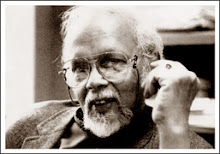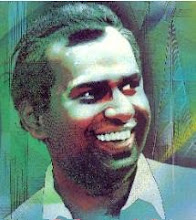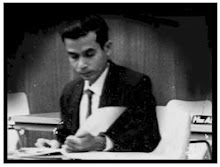 Priyankara Ratnayake is a senior lecturer of the Department of Drama and Theatre and Image Arts of the University of Kelaniya. He took a day off from the busy environment of his department to talk about his second creation `Thatu Ewith’ which is to be staged at Lumbini theatre, on May 17 at 7.00pm and 18 at 4.00pm/7.00pm. Priyankara produced `Thatu Ewith’ after a five year’s pause of ‘Oedipus’ in 2002.
Priyankara Ratnayake is a senior lecturer of the Department of Drama and Theatre and Image Arts of the University of Kelaniya. He took a day off from the busy environment of his department to talk about his second creation `Thatu Ewith’ which is to be staged at Lumbini theatre, on May 17 at 7.00pm and 18 at 4.00pm/7.00pm. Priyankara produced `Thatu Ewith’ after a five year’s pause of ‘Oedipus’ in 2002.
What is this `Thatu Ewith’ about?
This is a translation of Spanish drama called ‘The House of Bernada Alba’. It is very interesting and I feel that it is every woman’s story. The story depicts strikingly a family of five daughters with divergent qualities and a grand mother who are dominated by a mother. Five daughters fight against the mother’s dominative and arbitrary demeanour and try to go in search of their own freedom. Suppressed sisters always fight with one another.
There is a concealed character in this drama , a young chap to whom when the mother longs to give one of her daughters in marriage all five daughters fall in love with. When the mother proposed one of her daughters to the young boy , he falls in love with another one of five daughters whom other infatuated sisters become envious of.
 This story amply shows envy, hostility, frustration and clamour. When the breach of the peace in the family occurs, the bond of the family too fractures. Thus the whole family is affected by the mother’s pungent authority and ultimately one daughter commits suicide. Thus the family faces a tragic predicament.
This story amply shows envy, hostility, frustration and clamour. When the breach of the peace in the family occurs, the bond of the family too fractures. Thus the whole family is affected by the mother’s pungent authority and ultimately one daughter commits suicide. Thus the family faces a tragic predicament.
Similar examples can be found abundantly in society . This story also shows how an individual influences a small community. This world can neither be an abode only for women nor for men. It is for both male and female. That is the rule of the nature. If someone tries to break the rule, he will be in trouble. That is ironically depicted using only female characters.
You have taken only female characters in this drama. But Gayan Randhira plays the role of the grand mother. Why did you think of choosing a male to a female character?
The grand mother - Maria Yosopha is a rigorous, boisterous and a belligerent type of a character. I preferred a male because a male would better act than a female and also the grand mother a female that resembles more of a man. I think at a glance no one could identify that a grand mother’s role is played by a male.
You have added more music, dance, humour and entertainment to ‘Thatu Ewith’ which are not seen in the original Spanish drama, ‘The House of Bernada Alba’?
Yes. Music, dance, humour and amusement are not seen in the original drama, but I added those things on purpose so as to be commensurate with the Sri Lankan audience’s taste and the deep message of the drama to be given in a much lighter way. Because people come to theatres to be free from their busy engagements and enjoy themselves.
Do you think ‘humour’ is an essential feature of a drama?
I agree with the fact that ‘humour’ is an essential feature of a drama to a certain extent. A drama should not be full of vain humours. Facetious parts in a drama grab the audience’s attention and are able to make them laugh. There are many dramas produced only for humour and they are hardly able to convey any beneficial message. A successful drama consists of a little bit of humour as well.
Ancient Greek dramas had a vast spectrum of audience. When a drama was being shown, the audience of every category from the king down to the beggar used to throng at theatres. Unfortunately, today we are hardly be able to find houseful theatres. What do you think the reason can be?
 The reason is that, producers haven’t identified what the audience need. They produce dramas according to what they need. A drama should be first delivered to the heart and through that people use their brain to relate the message. When the drama lacks amusement and if it is full of gibberish incidents people are reluctant to watch them and perhaps are unable to comprehend the in - depth meaning of the drama.
The reason is that, producers haven’t identified what the audience need. They produce dramas according to what they need. A drama should be first delivered to the heart and through that people use their brain to relate the message. When the drama lacks amusement and if it is full of gibberish incidents people are reluctant to watch them and perhaps are unable to comprehend the in - depth meaning of the drama.
Another reason is that tele dramas and films are available in abundance in society. People are attracted to them in a great deal. Likewise the economic conditions of the people too matter a lot. They can watch tele dramas at home free of charge. They need money to go for a stage drama. Also the support of the media for stage drama is minimal compared to tele dramas and films.
Even under such circumstances we have a good audience for stage dramas. When this ‘Thatu Ewith’ was first shown in the university people from outstation came to watch it.
 Don’t you think it is a challenge to make stage dramas under such circumstances?
Don’t you think it is a challenge to make stage dramas under such circumstances?
It is a double - edged razor. We have to carry experiments in a drama itself to identify the audience’s preferences. A good stage drama producer should never let the audience be taken away from the drama and yawn in idleness.
Have you been able to get adequate profit by making stage dramas?
I never expect a huge profit out of stage drama. Actually it is hard to make money from stage dramas. I have merely been able to cover up the production cost of the drama. I do stage dramas solely because it is a subject I teach at the university and to get a satisfaction.
What is the trend for fine arts in contemporary youth?
Quite satisfactory. Lot of students choose fine arts as a subject at the university. I have students who have done their basic degrees in Medicine, Engineering and Law and they have selected drama and theatre for their Masters and post - graduate studies. I think the reason is the high calibre performance of our old University students.
A university student gets the chance to act at least in three classic dramas at the university. They are well experienced and qualified. My students have won awards for their performance. They have excelled in drama and theatre and that is a good example for others.




































this is an awesome concept... can't wait to see the play...
ReplyDelete